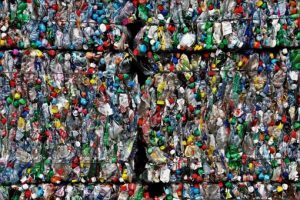Getting on top of the Plastic Packaging Tax
Are you affected by the new UK Plastic Packaging Tax? Any plastic packaging that does not contain at least 30% recycled plastic content may be subject to the tax, at a rate of £200 per metric tonne of plastic used.

What is the plastic packaging tax?
Introduced in April 2022, the tax covers plastic packaging products that do not contain at least 30% recycled content. Products &/or businesses will be charged £200 per metric tonne of plastic used in the packaging. The tax affects both UK producers and importers of plastic packaging of over 10 tonnes per year, but also (maybe surprisingly) covers packaging that is already ‘filled’ when being imported into the UK.
It is astounding to think that 5 million tonnes of plastic are used in the UK every year. Half of this is packaging and very little is actually recycled.
The thinking behind the new tax is that it will actively encourage businesses to use recycled plastic materials. This should create greater demand for recycled content, thus stimulating increased levels of recycling, helping to divert it away from landfill or incineration.
Types of packaging affected
There are 2 types of packaging that qualify for the new tax:
1) – packaging component used in a supply chain, from the manufacturer of the goods to the user; this can be used alone or in combination with other products.
2) – single use consumer packaging.
Any packaging here does one or more functions: contain the goods, protect, handle, present or deliver the goods.
As well as packaging manufactured in the UK, the tax applies to finished packaging that is imported into the UK for use (e.g. polythene bags purchased in order to pack products in) and also to prefilled packaging that is imported (e.g. bottles containing drinks). However, the transport packaging used to import goods is exempt from the tax (e.g. shrink wrap or packaging used to ship goods into the UK).
The tax only applies to the weight of the plastic packaging, although all plastic (even if is 30%+ recycled) counts towards the 10-tonne threshold.
Of course packaging is rarely simple – what about packaging products that contain a mix of materials? If plastic is the single largest material by weight, the entire item will be considered as plastic packaging. For example, a pack containing 4g plastic, 3g steel and 3g paper, would be classed (and taxed) as 10g of plastic.
Unfortunately, compostable, biodegradable and bio-based plastics are not be exempt from the tax.
There is no certification system for proof of recycled content, so it’ll be down to the manufacturer or importer to provide this information. It will be important to check out your suppliers properly (due diligence) and keep good records.
Who is responsible for paying the tax?
The tax will fall to those businesses that manufacture or import 10 tonnes or more of plastic packaging over a 12-month period.
These businesses will need to register with the HMRC and pay the applicable tax on a quarterly basis.
They must also keep accounts and records to support the information submitted in the quarterly tax returns. These must also be kept for a minimum of 6 years.
All businesses that manufacture or import plastic packaging, even in small quantities, should keep records to prove they are under the threshold.
If you’re not directly responsible and are only an end user of plastic packaging, expect the price of your packaging to go up (tax being passed on to the customer).
Reduce the tax burden
Of course, it’ll be best to avoid (or at least reduce) the tax – the obvious way is to switch to products with least 30% recycled plastic content or completely different materials (e.g. paper-based [corrugated] products); also reduce the overall amount of plastic bought or trying out reusable packaging.
More info from the government is available here.

